Iran Says It Will Expand Cooperation With Other Countries On Drones
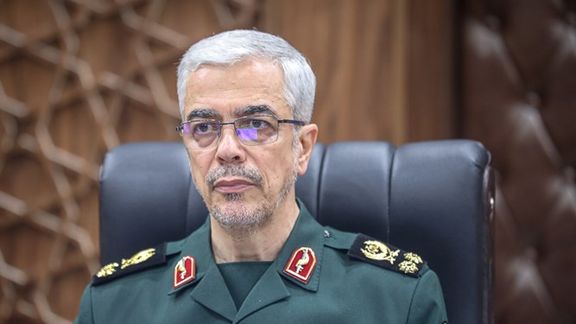
A top Iranian military official says the Islamic Republic will continue to develop drones according to its interests and Tehran will cooperate with other countries in this regard.

A top Iranian military official says the Islamic Republic will continue to develop drones according to its interests and Tehran will cooperate with other countries in this regard.
According to IRNA, Chief of General Staff of the Iranian Armed Forces Major General Mohammad Bagheri said Sunday that the country’s UAVs are accurate enough to respond to any threat endangering its interests.
This comes as the Biden administration launched a task force last week to see how US and western components are ending up in Iranian drones used in Russia’s war on Ukraine.
Although strict measures were in effect to prevent the Islamic Republic from obtaining such materials, some evidence shows Tehran has more than enough access to US-made microelectronics that are used in manufacturing drones.
Last month, a UK-based investigative organization found that over 80 percent of the drones downed in Ukraine have components made by US companies.
Kyiv has accused Tehran of supplying 1,700 Shahed-136 loitering munitions to Moscow, which it says have been used to hit targets in Ukraine since September. Iran denies the allegations.
The United States and its European allies, as well as the European Union have sanctioned various Iranian individuals and entities for supplying drones to Russia.

The US Congress has reportedly passed the Masih Alinejad HUNT Act, named after the US-based journalist who was the target of a kidnapping plot by Tehran last year.
“It’s official: Congress has passed the Masih Alinejad HUNT Act, imposing mandatory sanctions on Iranian officials responsible for ongoing suppression of basic human rights in Iran and identifying any foreign banks transacting with those sanctioned individuals,” Twitter account of Senate Banking Committee Republicans said on Saturday.
Its Ranking member is Pennsylvania’s Republican Senator Pat Toomey, who cosponsored the act with Maryland Democrat Senator Ben Cardin. The Masih Alinejad Harassment and Unlawful Targeting Act of 2021 or the Masih Alinejad HUNT Act of 2021 was introduced in the Senate in December 2021 after the New York-based journalist was the target of an Iranian plot to kidnap her and take her to Iran via Venezuela, according to US law enforcement. On July, a man armed with a loaded AK-47 was arrested outside the Brooklyn home of the Iranian dissident and women’s rights activist. A federal complaint said the man named Khalid Mehdiyev, 23, was found with the assault rifle, multiple high-capacity magazines and additional rounds of ammunition and a suitcase full of cash as well as two other different license plates when he was arrested after lurking in the area for two days.
This bill imposes sanctions on foreign persons (i.e., individuals or entities) that are acting on behalf of Iran's government and involved in the harassment of certain individuals, such as human rights activists.
The news about the adoption of the bill was announced on Christmas eve, December 24 when the US Congress is in recess. It is not clear when it was approved, unless if it was part of the omnibus budget bill that was passed right before the holidays.
The bill requires the Department of State to periodically report to Congress on the identities of foreign persons acting on behalf of the Islamic Republic regime that are knowingly responsible for or complicit in the surveillance, harassment, imprisonment, or killing of citizens of Iran or the United States. These can be individuals “who seek to expose corruption or illegal activity by Iranian government officials; obtain, defend, or promote internationally recognized human rights; or obtain, defend, or promote the rights and well-being of women, religious and ethnic minorities, and the LGBTQ community in Iran.”
The report must include foreign persons involved in such actions that occur inside or outside Iran, and then the US president must impose property-blocking sanctions on such person, as well as visa-blocking sanctions on the identified individuals.
The Department of the Treasury must also submit to Congress a report identifying any foreign financial institution that knowingly conducts a significant transaction with a person sanctioned under this bill. The Treasury may prohibit the opening or impose strict conditions on the maintaining of a US correspondent account by such a financial institution.
Dozens of Iranian journalists in other countries, including those working for BBC Persian TV and London-based Iran International TV, repeatedly complain about their own and their family members' harassment in Iran, and say they have been threatened by authorities about possible actions.
Iran executed in December 2020 Rouhollah Zam, editor of a social-media channel, after he was kidnapped in Iraq and convicted on security charges and televised confessions, without due process of law.
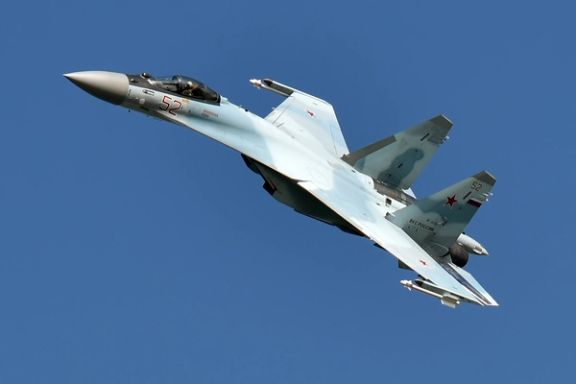
Russia is reportedly preparing to provide the Islamic Republic with Sukhoi Su-35 fighter jets in the near future, Israeli media have reported.
Israel’s Channel 12 quoted some Western intelligence officials on Saturday that as many as 24 jets that were originally intended for Egypt, but thwarted by the US, could be delivered to Tehran.
The Times of Israel says the report also indicated that Iranian pilots have already been trained to use the jets.
Washington has been recently warning that Tehran and Moscow have extensively developed their military relations, as Iran has supplied kamikaze drones that Russia has used against Ukraine.
Both countries are hit by harsh sanctions — the Islamic Republic over its nuclear program and Russia for its war on Ukraine.
A top Ukrainian official called Saturday for the "liquidation" of Iranian factories making drones and missiles, as well as the arrest of their suppliers.
Writing on Twitter on Saturday, Ukrainian presidential aide Mykhailo Podolyak said Iran "blatantly humiliates the institution of international sanctions", before calling for the destruction of Iranian weapon factories in response.
Kyiv has accused Tehran of supplying 1,700 Shahed-136 loitering drones to Moscow. Iran has acknowledged drone deliveries but insists this was not for war in Ukraine.
Western governments have also voiced concern over possible Iranian plans to supply missiles and more weapons to Russia, as the United States and its allies have been sending weapons to Ukraine to turn the tide of the war and not allow Russia to capture more Ukrainian territory.
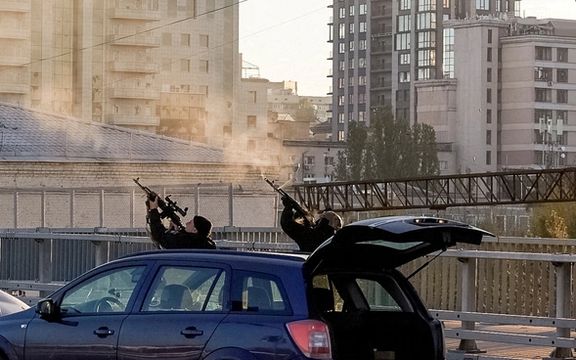
A top Ukrainian official has called for the "liquidation" of Iranian factories making drones and missiles, as well as the arrest of their suppliers.
Writing on Twitter on Saturday, Ukrainian presidential aide Mykhailo Podolyak said Iran "blatantly humiliates the institution of international sanctions", before calling for the destruction of Iranian weapon factories in response.
“Iran, planning to boost missile, drone supplies for Russia, blatantly humiliates the institution of international sanctions… Important to abandon nonworking sanctions, invalid UN resolutions concept, & move to more destructive tools – liquidation of plants, arrest of suppliers…,” he tweeted.
Podolyak’s statement comes days after Ukrainian President Volodymyr Zelenskyy visited Washington to solidify US military and economic support for his country.
It was not clear if the tough statement by the Ukrainian official meant as a suggestion for the US to undertake the destruction of Iranian drone factories, a feat that would mean a military attack on Iran and possibly a regional war in the Middle East. Israel in recent past targeted Iranian nuclear facilities in large-scale and successful sabotage acts,
Kyiv has accused Tehran of supplying 1700 Shahed-136 loitering munitions to Moscow, which it says have been used to hit targets in Ukraine since September. Iran denies the allegations.
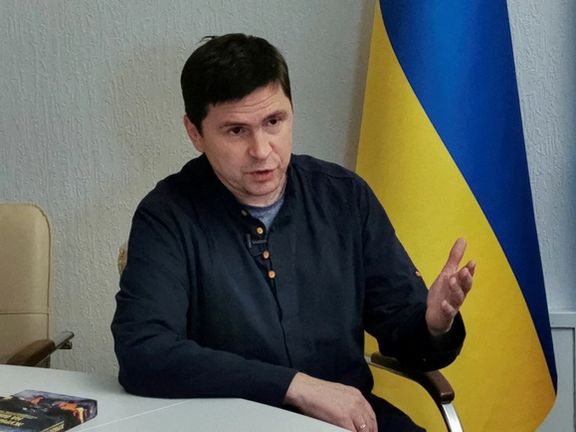
Kyiv has also accused Tehran of planning to supply more weapons to Russia, including missiles that Moscow needs as its stockpiles dwindle after months of relentless attacks against civilian and military targets.
Western governments have also voiced concern over possible Iranian plans to supply missiles and more weapons to Russia, as the United States and its allies have been sending weapons to Ukraine to turn the tide of the war and not allow to capture more Ukrainian territory.
Ukraine's espionage chief said in an interview released on Friday that Russia had already launched around 540 of the drones at military and energy targets in Ukraine.
The United States and its European allies, as well as the European Union have sanctioned various Iranian individuals and entities for supplying drones to Russia. As the United Kingdom imposed sanctions on Iranian entities December 13, foreign secretary James Cleverly said that the UK sanctions were “taking the wheels off the Russian war machine.” A statement issued by the foreign offcie referred to “information” released by the US December 9 - apparently a statement by White House National Security spokesman John Kirby - showing Iran had become “one of Russia’s top military backers.”
Iran has denied supplying weapons to Russia for its war in Ukraine, but foreign minister Hossein Amir-Abdollahian after earlier denials acknowledged in early November that Tehran had supplied drones to Moscow “months before” the Ukraine war, leaving it vague if these were used in the war.
In a second tweet, Podolyak also mentioned North Korea and Belarus as countries aiding Russia’s war effort, saying, “Iran (drones/missiles), North Korea (ammunition/weapons), Belarus (infrastructure/territory/equipment). Factually & legally confirmed allies of RF in the war of aggression, mass murders of civilians & deliberate destruction of Ukrainian cities. There will be joint accountability.”
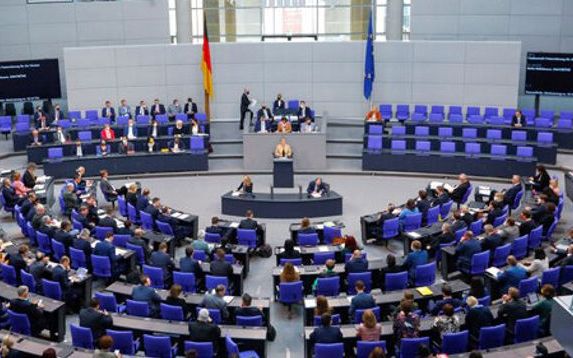
A group of 43 members of the Social Democratic Party in the German Parliament demanded that the Islamic Revolutionary Guard – or IRGC --be designated as a terrorist group.
Some representatives said, "A regime that defends its survival only by assassinating its own people has lost its legitimacy." Considering that other German parties such as Alliance 90/The Greens, and Free Democratic Party also seem to favor such a measure, it is possible that the IRGC will be blacklisted by Berlin and the European Union. The list of countries that have designated the Revolutionary Guard is increasing.
Kaweh Mansoori, a member of the party with Iranian roots, also said, "We are ready to take tougher and more intense steps than the previous sanctions of the European Union against the barbaric clerical regime.”
In November, the German parliament – the Bundestag -- passed a comprehensive package of measures against the Islamic Republic following a session on the current situation in Iran. The ratified motion, submitted by a coalition of factions, called on the German government to support the protest movement in Iran and increase pressure on the regime in Tehran.
The lawmakers also called to further examine whether and how the Islamic Center in Hamburg (IZH) can be closed for good, calling it "the hub of the operations of the Iranian regime in Germany.” Germany has already expelled Iranian cleric Soleiman Mousavifar, who was the deputy head of the IZH, from the country for his support for Shiite extremist and terrorist organizations.
Moreover, on Thursday the Dutch Parliament passed a motion urging the government to support EU's proscription of IRGC as a terrorist organization, considering the repression of protesters and supply of drones to Russia.
The motion was introduced to designate the IRGC as a terrorist group both at the national and European level.
Earlier this month, the EU designated 20 people and Iran’s state media over reported human rights abuses, along with eight people or entities over sending drones to Russia.
The pressure on the IRGC is not limited to putting it on the list of terrorist organizations, as there are other demands about human right issues related Tehran’s crackdown of dissent.
Several members of the German parliament have politically sponsored Iranian political prisoners most of whom are in danger of imminent execution on bogus charges. The number of German MPs taking political sponsorship of Iranian protesters is growing. Political patronage or sponsorship (politische patenshaften in German) is a way for the lawmakers to select a specific political prisoner and use their political weight to campaign for the prisoner’s freedom. This is mainly done by addressing the ambassador and the relevant government and international institutions dealing with human rights.
Also on Tuesday, all 183 members of the Council from four major parties said they will sponsor 183 prisoners including those sentenced to death for their participation in the current wave of antigovernment protests in Iran, ignited by the death in custody of 22-year-old Mahsa Amini.
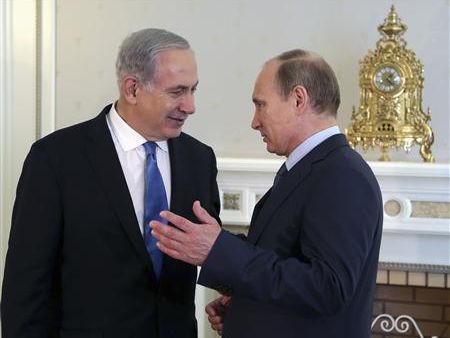
Russian President Vladimir Putin held a phone call with Israeli prime minister-designate Benjamin Netanyahu Thursday, a day after the Ukrainian President Volodymyr Zelenskyy visited Washington.
Putin congratulated Netanyahu on forming a government while the new Israeli leader told Putin that “he hopes a way will be found quickly to end the war [with Ukraine] and the suffering it has caused.”
The two also discussed the Islamic Republic’s attempt to entrench itself militarily in Syria, which borders Israel. During his previous term as prime minister, Netanyahu worked out a deconfliction agreement with Moscow whose army operates in Syria, to allow Israel to conduct aerial attacks against Iranian targets and their proxies without tangling with Russian forces. Netanyahu told Putin he “is determined to prevent Iran from obtaining nuclear weapons and to halt its attempts to establish a military base on our northern border.”
Since Netanyahu left office in 2021, Moscow has stepped up its military alliance with Tehran, which has provided Russia with armed drones for its invasion of Ukraine.
After Netanyahu won the election on November 1, Zelensky called Netanyahu, as did US President Joe Biden, French President Emmanuel Macron and British Prime Minister Rishi Sunak but it took weeks until Putin’s first public call.
Ukraine's President Volodymyr Zelensky told The New York Times on December 21, that Netanyahu's "personal relationship" with Putin could affect the "historical relations" between Israel and Ukraine. He added that “if he wants to maintain the historical relations between Israel and the Ukrainian people, you have to do everything you can to save as many people as possible."